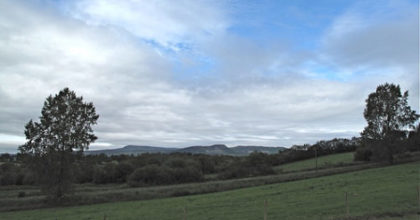
 )
)Having just observed St. Patrick’s Day, I thought it fitting to discuss some science news from Ireland. Apparently, so did NBC since they chose Sunday to report on research published last October. A team led by Gerry Quinn isolated a new strain of Streptomyces bacteria that can inhibit the growth of 4 out of 6 high priority antibiotic-resistant pathogens. Resistance to existing antibiotics continues to spread, while the pipeline of new antibiotics has hit a lull. So there is great interest in any compounds that can be used to treat infections which elude most or all of our current therapeutic options.
The new Streptomyces was found in the soil of Northern Ireland. Apparently, the biologists opted to look there because of a local tradition of using soil samples to treat infections. While our ancestors might not have a fully developed scientific method or even knowledge of the existence of bacteria, they still had the same capacity we have to make observations, develop theories, and put them to the test. Thus there is merit to investigating folk medicine traditions which have stood the test of time. And when it comes to antibiotics, microbes have proven to be a fruitful source. The Streptomyces genus alone has provided two thirds of our existing antibiotics. Bacteria have had billions of years to search through the space of possible chemicals to find effective compounds for dealing with competing species. Why should we try to reinvent those wheels when we cannot possibly try as many candidates?
Focusing our search for new antibiotics by using folk medicine is an interesting intersection of the sciences and the humanities. Another related intersection is the sci-fi comic series Surgeon X. The story of a rogue medical professional takes place in a near future version of our world where antibiotic resistance has tipped over into a global crisis. There are essentially no treatments for bacterial infections. While this is an extreme scenario, it does an excellent job of highlighting just how critical antibiotics are to current medical practice. For those of us blessed with relatively good health, antibiotics may be primarily what kids take for ear infections or strep throat. As such, they are certainly helpful, but not obviously essential. Yet antibiotics provide a foundation for many other medical advances. Many surgical procedures rely on the availability of antibiotics to prevent or treat post-operative infections; without them, survival rates would be notably lower. Similarly, chemotherapy for cancer and treatments for a variety of other conditions reduce the effectiveness of our immune systems; patients receiving those treatments depend on antibiotics to pick up the slack. Therefore, the health of patients with numerous conditions not directly related to bacterial infections nevertheless rely on the ongoing effectiveness of our ability to eliminate those infections. Hence the excitement over potential new antibiotics from Irish soil.
One challenge in answering questions is narrowing down the potentially vast space of possible answers. Here, focusing on folk medicine proved useful. Have you ever looked outside your field for help in zeroing in on an answer?
Andy has worn many hats in his life. He knows this is a dreadfully clichéd notion, but since it is also literally true he uses it anyway. Among his current metaphorical hats: husband of one wife, father of two teenagers, reader of science fiction and science fact, enthusiast of contemporary symphonic music, and chief science officer. Previous metaphorical hats include: comp bio postdoc, molecular biology grad student, InterVarsity chapter president (that one came with a literal hat), music store clerk, house painter, and mosquito trapper. Among his more unique literal hats: British bobby, captain’s hats (of varying levels of authenticity) of several specific vessels, a deerstalker from 221B Baker St, and a railroad engineer’s cap. His monthly Science in Review is drawn from his weekly Science Corner posts — Wednesdays, 8am (Eastern) on the Emerging Scholars Network Blog. His book Faith across the Multiverse is available from Hendrickson.

Leave a Reply